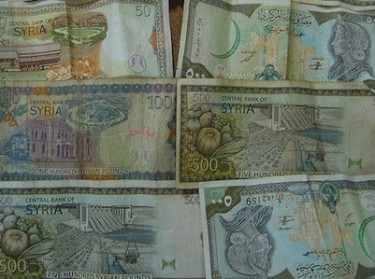This post is part of our special coverage Syria Protests 2011.
On Friday 24 June, 2011, Syria marked the 100th day since the start of the country's protest movement. Protests every Friday have become almost a ritual.
But there's another side to the story. For 100 days the country's economy has been frozen. Commerce has halted to a standstill and the coming tourist season does not look good. In addition to that, thousands of frightened Syrians have been changing their savings from Syrian pounds to US dollars or Euros, putting an enormous pressure on the Syrian pound.
In fact for a period of 48 hours in the beginning of April, the pound lost almost 10 per cent of its value, sparking fears of an eminent meltdown.
Meltdown threat?
The Syrian Central Bank has been successful so far in keeping the currency from dangerous devaluation. But with the new measures announced by the president in hist first speech in March; raising salaries, and raising the state's oil subsidies, and without any significant tax income, many have been pondering the possibility that the country might go bankrupt.
Many in the opposition are even working hard towards that goal. Their argument is that an economic meltdown will deal a fatal blow to the regime, and will make everybody turn against him. Others, however, are very skeptical of that scenario. Syrian blogger, nuffsilence, argues such:
To be honest, I'm not so sure how an economical collapse will help anything. If the regime is strong enough to survive the protests, then it may also weather another crisis. A fall of the regime isn't a sure result were the market to crumble and fall. We shouldn't forget that Mugabe and Saddam survived both and more. Mugabe, especially, had seen to it that his country's economy was beyond repair, and yet, it didn't inflict much damage on his power grip.
Syrian economist, and frequent guest-blogger at Prof. Joshua Landis’ Syria Comment, Ehsani, tried to answer these questions about the future of the Syrian economy:
Is bringing down the economy and bankrupting the country a realistic danger?
And as for the Lira. Is there a way to manipulate the currency from outside the country? Is it technically possible to put pressure on the Lira from governments outside?
On the main economic challenges, he says:
Syria’s economic challenge is twofold:
Excessive government spending on subsidies and the constantly bleeding public sector with little tax revenues to match. This budget deficit is a major challenge. Sub-par economic growth and hence job creation. The domestic purchasing power is too weak to support economic growth of 7-8%, which is the rate needed simply to produce enough jobs for all those presently coming of working age. The government is too broke to spend and invest. This leaves investments and exports. Syria is so far behind when it comes to infrastructure and human and capital resources that it is nearly impossible to catch up and compete in the global economy when it comes to exporting its products and services. This leaves investments. The political background has made slowed foreign investments to a trickle. It will be a while for this to change. Domestic investors need to see significant reforms before they decide to take risk with long term investments. The government has done very poorly on the legislative side when it comes to offering incentives and cutting red tape for potential investors.
Some of the commenters however had a more optimistic view of the crisis; Why Discuss says, in his reply to Ehsani:
This is the best time to buy SP! I’ll do that now. It gives 9% in the bank, while the Euro is eroding.
Just a thought
Contrary to the western countries, Syria never lived beyond its means. Except for the a few westernized Syrians, usually Syrians are frugal and they are not into the vicious circle of consumerism.
The next few years in Syria won’t be worse than Greece or Spain and Portugal, don’t you think?
This post is part of our special coverage Syria Protests 2011.








1 comment